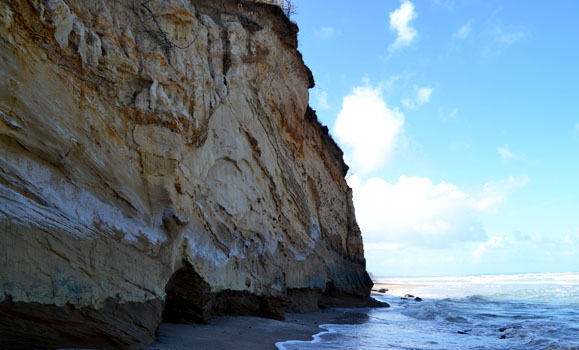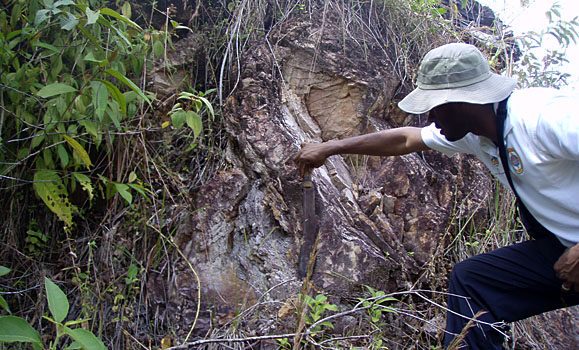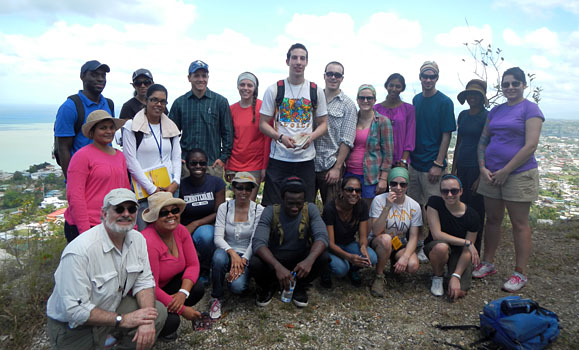Secluded beaches, calypso music and the entertaining carnival are often what come to mind when thinking of the islands of Trinidad and Tobago. But Dal Earth Sciences students might first consider Trinidad’s natural resources.
Each year, students enrolled in a petroleum geoscience course venture to the small island of Trinidad and observe an active petroleum system.
The intensive winter course is ERTH 4156: Petroleum Geoscience Field Methods, and allows Earth Sciences students to take their classroom learning into the field at an active site in Trinidad. Over their study break, they visit Trinidad’s second capital, San Fernando, continuing onto seven other locations on the 2,000-square-mile Caribbean island.
Grant Wach, Earth Sciences professor and director of the Basin & Reservoir Lab, teaches the petroleum geoscience course. Dr. Wach created the program in 2002, with the first trip to Trinidad taking place in 2003. The islands offered the perfect place to hold the field trip portion of the course.
“When I was with Texaco [now Chevron], I worked with our Trinidad business units for six years, so I was familiar with the offshore and onshore geology,” says Dr. Wach. “I realized it was the best place in the world to teach students about oil.”

Learning by observation
The course’s 15 students, some soon-to-be graduates, learn through observation and working closely with experts in the local the oil and gas industry. The information on what they've studied in class — including petroleum geology, source rock evaluation and seismic stratigraphy (a technique used in oil exploration to learn about the biology of sedimentary rock) — comes full circle, and the equipment used to understand the earth’s internal structure is now in their hands.
“It’s much easier to teach in the field when ready props at hand are available to compliment what I’m teaching in the classroom,” says Dr. Wach.
Carlos Wong, a future Dal grad with a combined major in Computer Science and Earth Sciences, is a past student of the Petroleum Geoscience Field Course. Working at Dalhousie’s Basin & Reservoir Lab since 2013 as a research assistant, Wong specializes in computing geoscience and spatial technology. His first taste of digital stratigraphy happened on his class Trinidad trip in 2013, getting to see the entire process of hydrocarbon generation and production within petroleum systems and the deposition of sediments.
“By understanding this system, we can also understand the processes in Nova Scotia," said Carlos, on comparing Trinidad to the Nova Scotia offshore petroleum systems.

Hayley Vincent, senior geoscientist with BP Trinidad and Tobago.
Networking one step at a time
The trip is a great opportunity for students to explore their career prospects. They establish relationships with various oil and gas experts, from companies including Beyond Petroleum (BP), Trinity Oil and Petrotrin, through to organizations like the Geological Society of Trinidad and Tobago and faculty and students at the University of West Indies.
“Dalhousie has strong affiliation with both oil and gas experts and industries in Trinidad, much thanks to the hard work of Dr. Wach”, says Alex Hartnett, one of many volunteer students in Dalhousie’s Basin and Reservoir Lab. These partnerships expand the opportunities for students on the trips: the experts get to share their knowledge and experience, while students gain perspectives on the field
One industry instructor had a special Dal connection: senior geoscientist Hasley Vincent, representing BP Trinidad and Tobago, received the Canadian Commonwealth Scholarship in 2004 to complete his PhD in Earth Sciences at Dalhousie. He currently serves as adjunct professor at Dal and the University of West Indies.
Alex learned a lot about Trinidadian culture just by connecting with the professionals who accompanied the students on their field trip. “Industry instructors were crucial in adding to the field school with their knowledge and resources of the Trinidadian petroleum systems,” he explains.

Growing in popularity
Recently, the course become more popular among Earth Sciences students, and Dr. Wach doesn’t plan to stop here. “This is the one course students will refer to long after they’ve completed the course, and for some, even after they’ve completed the program. Respectively, industry recruiters feel students remember this field course,” he says.
Planning for the Trinidad field trip in Winter 2015 will be underway soon enough. If you have questions, or an expressed interest in enrolling, contact Dr. Wach at Grant.Wach@Dal.Ca, or read more online.

